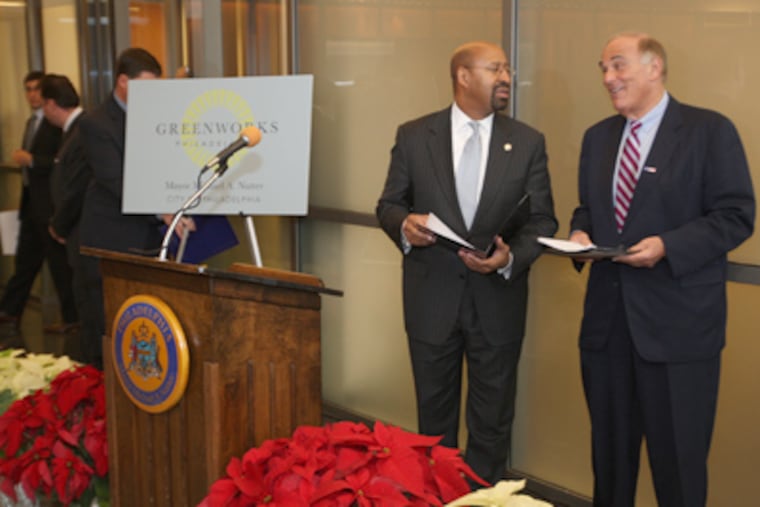From sunny forecast to dark clouds: The city solar project that didn't happen
Two years ago, Gov. Rendell announced that a Greek company would build a $500 million plant at Philadelphia's Navy Yard to make solar cells. The factory would employ 400 people when it began operations in late 2011.

Two years ago, Gov. Rendell announced that a Greek company would build a $500 million plant at Philadelphia's Navy Yard to make solar cells. The factory would employ 400 people when it began operations in late 2011.
Despite a promise of $49 million in state inducements, HelioSphera US Inc. never broke ground. Economic development officials quietly wrote off the project earlier this year.
"The project proponents were unable to raise capital and decided not to proceed," said John Grady, senior vice president of Philadelphia Industrial Development Corp., which had pledged to donate a 40-acre Navy Yard site to the solar-panel producer.
The demise of HelioSphera's American venture is a sensitive topic these days amid a solar market in upheaval. Three American solar companies sought bankruptcy protection in August, including Solyndra L.L.C., a Silicon Valley firm whose acceptance of $528 million in federal loans has renewed a Washington debate over the Obama administration's support for renewable energy.
HelioSphera, which had shopped itself to eight states, was promised a package of grants and loans including $5 million in federal stimulus money to locate in Philadelphia. Since the company could not secure private support, no public funds were expended, state officials said.
"We were able to not lose any taxpayer money on it," said Steven Kratz, spokesman for the Pennsylvania Department of Community and Economic Development.
HelioSphera's American venture appears to have been doomed by the same volatile market conditions that undermined Solyndra and other struggling solar-panel producers.
Despite soaring demand for solar cells in the United States, induced by 30 percent federal tax credits and additional state incentives, manufacturers have produced a worldwide oversupply because of huge increases in Chinese manufacturing capacity. Solar-cell prices have dropped 42 percent this year, according to the U.S. Department of Energy.
"Chinese companies have flooded the market with inexpensive panels," Jonathan Silver, the executive director of the Energy Department's loans programs, testified to Congress this month. "And Europe, historically the largest purchaser of solar panels, is in the midst of an economic crisis that has significantly reduced demand."
Silver defended the Obama administration's solar investments, which he said last year totaled 5 percent of the $30 billion that the Chinese government spent on developing solar.
"Why is China making this investment?" he said. "Because the race for solar-manufacturing jobs is a race worth winning. Over the next few decades this will become a global market worth trillions of dollars."
If it's a race, the United States is fading fast. In 1995, the American manufacturers produced more than 40 percent of the solar cells and modules sold worldwide, according to Silver. Today: 6 percent.
Despite their shrinking market share, American solar-cell producers increased their manufacturing capacity 34 percent this year, according to a report released Tuesday by the Solar Energy Industries Association, a Washington trade group. But output was essentially flat - 333 megawatts of modules produced in the second quarter - leaving more than 40 percent of the production capacity unused.
The declining price of solar panels is "fundamentally a good thing" for consumers because it makes solar power more competitive, said Shayle Kann, managing director of solar-power studies at GTM Research, a Boston firm that analyzes energy markets.
But he said the price decrease was causing "a painful period for manufacturers where they have to see if they can sink or swim in the new pricing environment."
It's unknown if a HelioSphera plant in Philadelphia could have competed in such an environment. Investors apparently were not sufficiently confident to put their money behind the venture.
HelioSphera operates a manufacturing plant in Tripoli, Greece, and specializes in production of thin-film photovoltaic panels. Photovoltaic panels absorb sunlight and convert it directly into electricity.
Two years ago, thin-film panels were rapidly growing in popularity for large-scale projects because of their low cost compared with traditional crystalline silicon solar panels, which produce more power per square foot, but at a higher price.
But the cost of the silicon raw material has dropped dramatically since 2009, reducing the price advantage of the thin-film panels.
"A ton of investment went into thin-film projects, but venture backing has evaporated," said Kann of GTM Research.
HelioSphera's lead equity partner, Plainfield Asset Management L.L.C., of Stamford, Conn., declined to comment about the disbandment of the company.
A former Plainfield managing director, Panos Ninios, who was also president of HelioSphera US, is now a partner in True Green Capital L.L.C., a New York private-investment firm that specializes in renewable energy. Ninios did not respond to telephone or e-mail messages.
For the Philadelphia Navy Yard, which is fashioning itself as a clean-energy research hub, the HelioSphera setback represents a lost opportunity. Rendell in 2009 had anticipated that in a decade the 400 jobs promised by HelioSphera "may be just a fraction of the number of people whom we employ here as solar continues to grow."
The sentiment now is nothing ventured, nothing gained.
"This was always considered to be an emerging venture," said Grady, the industrial development corporation official, "with a significant amount of risk."